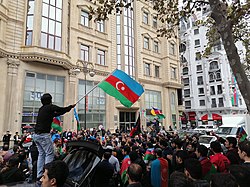Victory Day (Azerbaijan)
The Victory Day (Azerbaijani: Zəfər Günü) is a public holiday in Azerbaijan that is celebrated on 8 November, in commemoration of Azerbaijan being the victor in the 2020 Nagorno-Karabakh war. Established by the decree of the President of Azerbaijan, dated 2 December 2020, the holiday is celebrated on the day of the recapture of Shusha. It is a non-working holiday.
| Victory Day | |
|---|---|
 | |
| Official name | Azerbaijani: Zəfər Günü |
| Observed by | Azerbaijan |
| Type | Patriotic |
| Significance | in commemoration of Azerbaijan being the victor in the 2020 Nagorno-Karabakh war |
| Date | 8 November |
| Next time | 8 November 2023 |
| Frequency | Annual |
| Related to | 2020 Nagorno-Karabakh war |
Background
On 27 September 2020, clashes broke out in the disputed Nagorno-Karabakh region, which is de facto controlled by the self-proclaimed and unrecognized Republic of Artsakh, but de jure part of Azerbaijan.[1] Azerbaijani forces first advanced in Fuzuli and Jabrayil districts, taking their respective administrative centres.[2] From there, they proceeded towards Hadrut.[3] Azerbaijani troops began to advance more intensively after the fall of Hadrut around 15 October, and Armenians began to retreat, with Azerbaijanis then taking control of Zangilan and Qubadli.[4] Launching an offensive for Lachin,[5] they also penetrated into Shusha District through its forests and mountain passes.[6][7]
Following the capture of Shusha, the second-largest settlement in Nagorno-Karabakh, a ceasefire agreement was signed between the President of Azerbaijan, Ilham Aliyev, the Prime Minister of Armenia, Nikol Pashinyan, and the President of Russia, Vladimir Putin, ending all hostilities in the area from 00:00, 10 November 2020 Moscow Time.[8][9][10] Under the agreement, the warring sides will keep control of their currently held areas within Nagorno-Karabakh, while Armenia will return the surrounding territories it occupied in 1994 to Azerbaijan. Azerbaijan will also gain land access to its Nakhchivan exclave bordering Turkey and Iran.[11] Approximately 2,000 Russian soldiers will be deployed as peacekeeping forces along the Lachin corridor between Armenia and Nagorno-Karabakh for a mandate of at least five years.[12]
Institution of the holiday
On 2 December 2020, the President of Azerbaijan, Ilham Aliyev, signed a decree on the establishment of Victory Day as a public holiday in Azerbaijan. The day of the signing of the ceasefire agreement ending the war, and its entry into force by Azerbaijan Time, 10 November, was to be celebrated in Azerbaijan as the Victory Day.[13] The next day, this order was cancelled.[14] The holiday's celebration date was changed to 8 November, the day the Azerbaijani forces seized control Shusha, as the previous date overlapped with Mustafa Kemal Atatürk's Memorial Day in Turkey.[15] On 8 December, It was announced that a new station of the Baku Metro's Purple Line (B3) will be named "November 8" at the suggestion of Aliyev.[16]
References
- "Armenia and Azerbaijan fight over disputed Nagorno-Karabakh". BBC. 27 September 2020. Archived from the original on 27 September 2020. Retrieved 15 October 2020.
- Kucera, Joshua (29 September 2020). "As fighting rages, what is Azerbaijan's goal?". EurasiaNet. Archived from the original on 4 October 2020. Retrieved 8 November 2020.
The Azerbaijani offensive against Armenian forces is its most ambitious since the war between the two sides formally ended in 1994.
- Avaliani, Dimitri (12 October 2020). "Karabakh: the battle for Hadrut and why it's important". Jam News. Archived from the original on 9 November 2020. Retrieved 9 November 2020.
- Aksenov, Pavel (11 November 2020). "Почему Азербайджан выиграл войну в Карабахе? Отвечают военные эксперты" [Why did Azerbaijan win the war in Karabakh? Military experts answer]. BBC Russian Service (in Russian). Archived from the original on 11 November 2020. Retrieved 28 November 2020.
- Roblin, Sebastien (26 October 2020). "Despite Ceasefire, Fate Of The Nagorno-Karabakh May Turn On The Lachin Corridor". Forbes. Archived from the original on 2 December 2020. Retrieved 2 December 2020.
- Hakobyan, Tatul (17 November 2020). "Շուշին. պատերազմի իմ չգրված նոթատետրից" [Shushi. from my unwritten notebook of war]. CivilNet. Archived from the original on 1 December 2020. Retrieved 1 December 2020.
- "Azerbaijan says key Karabakh town captured, Armenia says it didn't happen". France24. 8 November 2020. Archived from the original on 28 November 2020. Retrieved 28 November 2020.
- "Путин выступил с заявлением о прекращении огня в Карабахе" (in Russian). RIA Novosti. 9 November 2020. Retrieved 9 November 2020.
- "Пашинян заявил о прекращении боевых действий в Карабахе" (in Russian). RIA Novosti. 9 November 2020. Retrieved 9 November 2020.
- "Nagorno-Karabakh: Russia deploys peacekeeping troops to region". BBC News. 2020-11-10. Retrieved 2020-11-11.
- Kramer, Andrew E. (November 10, 2020). "Facing Military Debacle, Armenia Accepts a Deal in Nagorno-Karabakh War". The New York Times.
- "Deal Struck to End Nagorno-Karabakh War". The Moscow Times. 10 November 2020. Retrieved 10 November 2020.
- "10 noyabr - Azərbaycanda Zəfər Günü kimi təsis olunub". BBC Azerbaijani Service (in Azerbaijani). 2 December 2020. Retrieved 4 December 2020.
- Aliyev, Ilham (3 December 2020). ""Azərbaycan Respublikasında Zəfər Gününün təsis edilməsi haqqında" Azərbaycan Respublikası Prezidentinin 2020-ci il 2 dekabr tarixli 2312 nömrəli Sərəncamının ləğv edilməsi barədə Azərbaycan Respublikası Prezidentinin Sərəncamı". President.az (in Azerbaijani). Presidential Administration of Azerbaijan. Retrieved 4 December 2020.
- "Azərbaycanda Zəfər Gününün vaxtı dəyişdirilib". BBC Azerbaijani Service (in Azerbaijani). 3 December 2020. Retrieved 4 December 2020.
- "İlham Əliyevin təklifi ilə yeni metrostansiya "8 noyabr" adlanacaq, Baş infeksionist Təyyar Eyvazov: "Epidemioloji vəziyyət pisləşməkdə davam edir"". BBC Azerbaijani Service (in Azerbaijani). 8 December 2020. Retrieved 8 December 2020.